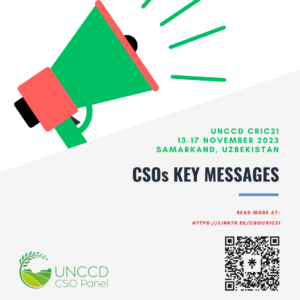Welcome to COP13
As the CSO focal point of the host country, China Green Foundation would like to welcome all the CSO friends who are here in Ordos. Chinese CSOs have been contributing to combatting desertification for decades at the grassroots level by sharing best practices, demonstrating pilot projects and engaging the public. Before COP13, there were only 3 CSOs accredited under UNCCD. Now the number has increased to around 20. We see the COP a great opportunity to learn from your experience, to explore collaboration among CSO level under the scope of “One Belt One Road” and “South-South Cooperation”. Let’s work hand in hand for a fruitful COP13 with active participation of CSOs!
CSO Network Widening
In the first session of COP13, Parties have approved the accreditation of more than 150 CSOs to the Convention. The number of accredited CSOs increased from 312 to 492. This has been achieved thanks largely to the efforts of CSO Panel over the last two years.
The Convention assigns CSOs specific roles and responsibilities for the implementation of the Convention. For many years, CSOs have been contributing to sustainable land management by co-generating and disseminating successful practices. Widening the global CSO network means higher impact and influence at both the local, regional and international levels.
The number of CSOs accredited under the UNCCD increased from 312 to 492.
CST Discussions: SPI proposed land rights as a guiding principle of LDN
On Wednesday the opening session of the Committee on Science and Technology stressed the importance of the contributions of the Science Policy Interface and, in particular, the scientific conceptual framework for achieving and assessing land degradation neutrality.
Civil society participants expressed their satisfaction that the conceptual framework takes into account the concerns put forward by civil society, especially:
sound indicators based on good principles for responsible land governance are proposed, including the protection of land user rights ; and
the inclusion of social aspects in the LDN framework (e.g. critical migration points, land rights, governance and gender issues, capacity-building for small-scale farmers).
Delegates commented with appreciation that the conceptual framework addresses intergenerational rights and favours definition of the situation of reference. It also takes note of the difficulties associated with measuring soil carbon and monitoring change in land net productivity, and appreciates the need to include local indicators along with the three primary LDN indicators.
The cultural and social dimensions and the involvement of local communities were highlighted as prerequisites to define LDN targets in the context of transformative projects.
Experiences of Benin, Columbia and Turkey illustrated different aspects of the target-setting process, including identification of LDN targets in Benin, the use of indicators to monitor LDN in Columbia, and elaboration of transformative projects in Turkey.
Land restoration by women contributing to LDN
In Burkina Faso, the Association for the Protection of the Environment and Rural Development (APEDR) assists women’s groups in the Yako community to restore degraded lands in order to use them for the production of organic vegetables.
As part of a local project, in partnership with SOLIDAGRO, women have been trained by APEDR in techniques of agroecological production. Planting of hedgerows composed of pulses, plot layout in zaï, and growing vegetables associated with Moringa are techniques that allow degraded lands to recover by limiting erosion. Moreover, women have learnt to make organic compost and biological plant treatments.
Women support kept up with access to market, a first contact has been taken with a organic certification organization. Niche markets have been targeted for selling the first products. Growing organic vegetables allows these women’s groups to sell products with an added value; it also improves households’ nutritional health while restoring the fertility of land by the use of organic manure.
Agroecology constitutes a complete answer to all sustainable production challenges and contributes to food sovereignty by proposing new innovative and adapted techniques for resilient agriculture.
Burkina Faso has set national LDN targets, which include enhancing land productivity and carbon stock; APEDR, as with other civil society organizations, contributes to LDN by leading projects on a local scale. It is vital to involve civil society and mobilise its expertise about sustainable land management and its knowledge of the local community in the design and implementation of transformative projects to achieve LDN.
One crucial issue remains to be addressed: securing land tenure for women’s groups, as they are still cultivating land that they don’t own.
One crucial issue remains to be addressed: securing land tenure for women’s groups, as they are still cultivating land that they don’t own.






